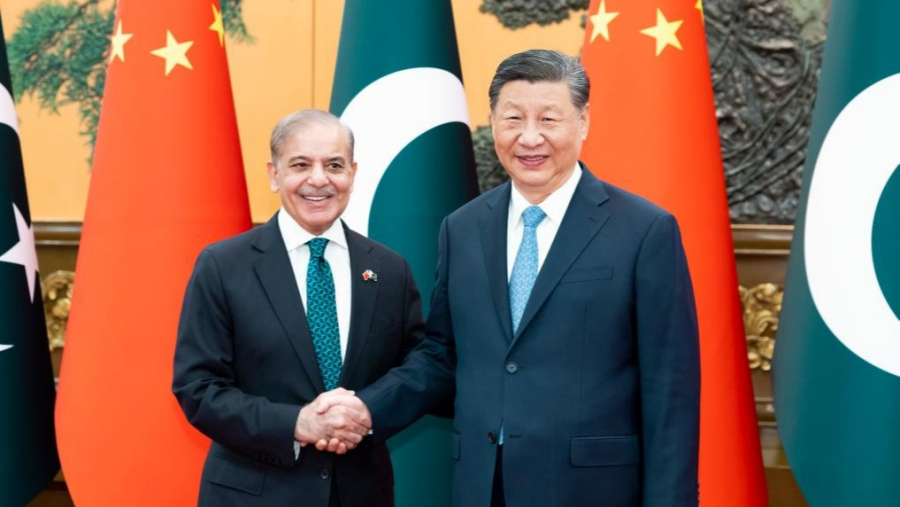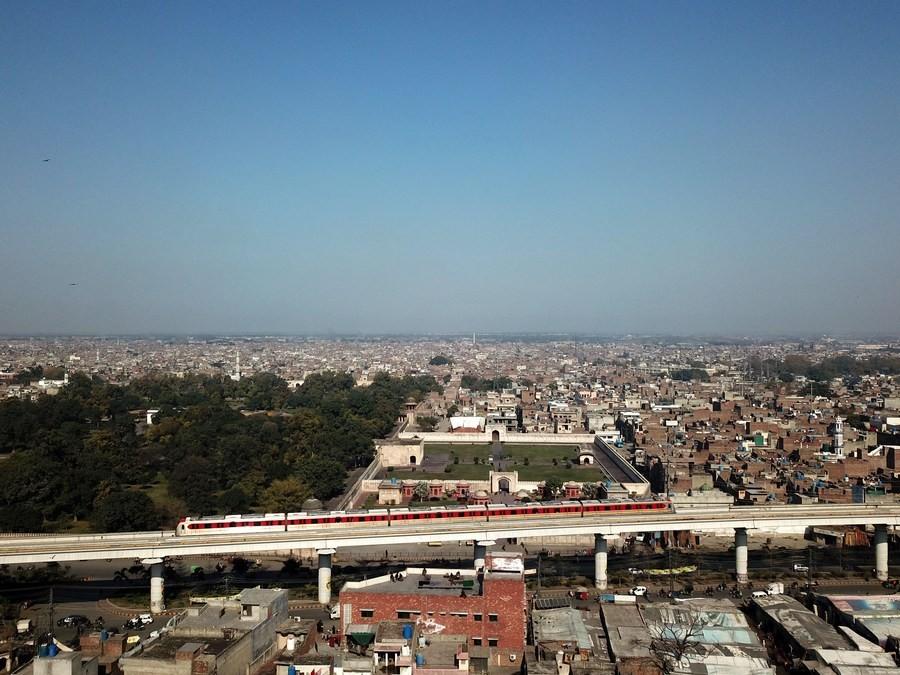
Chinese President Xi Jinping meets with Pakistani Prime Minister Shehbaz Sharif, who is on an official visit to China, at the Great Hall of the People in Beijing, the capital of China, June 7, 2024. [Photo/Xinhua]
By Azhar Azam
Pakistan's Prime Minister Shehbaz Sharif has wrapped up his official visit to China. During this visit, Sharif stressed enhancing business-to-business (B2B) cooperation, assuring Chinese investors of all-out facilitation and foolproof security in Pakistan and highlighting bilateral trade and investment potential in areas such as technology, industry, agriculture, mining, steel, textiles and renewable energy.
Lauding the Chinese model of development and vowing to replicate it in Pakistan, Sharif said, "I will go back to Pakistan with this resolve…we will follow this model of great economic transformation in Pakistan." His pledge was accompanied by the signing of 32 memorandums of understanding, billed as a "historic moment" of private-sector cooperation.
Regardless of rivalries, leaders of all political parties in Pakistan have described the relationship with China as the cornerstone of the country's foreign policy, and wanted to deepen the strategic ties with its closest partner, showing willingness to learn from China's experience to alleviate poverty and foster socioeconomic development, and expressed support to the one-China principle.
Pakistan's economy has been in the doldrums for some time. Sharif's visit to Shenzhen and Xi'an – featuring meetings with leading Chinese companies engaged in oil and gas, energy, information and communication, and emerging technologies – provides an opportunity for Pakistan to attract investment from China and bolster its gloomy economic outlook.
Upgrading the China-Pakistan Economic Corridor (CPEC) is Sharif's key focus. The flagship project of the Belt and Road Initiative has been contributing to infrastructure development, energy generation, and job creation in the country.

An Orange Line Metro Train running on the track in Lahore, Pakistan, February 2, 2024. [Photo/Xinhua]
The CPEC is estimated to have brought $25.4 billion in direct investments to Pakistan. These investments have been translated into 236,000 jobs, 510 kilometers of roads, over 8,000 megawatts of electricity and 886 kilometers of core transmission network, strengthening Pakistan's socio-economic development and the China-Pakistan all-weather comprehensive strategic cooperative partnership.
Admitting the CPEC had certainly improved Pakistan's transportation and energy sectors, and drastically reduced power outages, some argue it didn't make any impact on Islamabad's productivity and growth and rather burdened the country with debt. Such analysis overlooks several factors that have exacerbated Pakistan's economic and debt crisis.
For instance, a recent World Bank report noted that Pakistan faced an imminent economic crisis due to the impacts of "inadequate macroeconomic management," surging commodity prices, global monetary tightening, catastrophic flooding in 2022, and political uncertainty. Amid inflation of as high as 40 percent in 2023 with foreign reserves falling to a dangerously low levels, China yet again rescued Pakistan's economy from plunging into an economic crisis by rolling over its debt of an estimated of about $8 billion.
China isn't responsible for the Pakistan debt crisis either since it accounts for just 13 percent or less than $17 billion of Pakistan's $130.4 billion total external debt as of March 2024. Independent estimates too quote the same figure (13 percent), emphasizing Islamabad's problem is primarily domestic debt, which comprises much of debt stock and interest burden. Beijing clearly has no role in ballooning Islamabad's foreign debt.
The World Bank predicts Pakistan's growth at 1.8 percent in 2023-24, which it says is insufficient to reduce poverty with 40 percent of Pakistanis living below the poverty line. While it urges Islamabad to implement an articulated and credible structural reform program to improve the economic outlook, Sharif's focus on upgrading the CPEC, advancing trade and investment and deepening cooperation on areas such as energy, space, IT and defense and security as well as strengthening B2B cooperation could be critical to push the economic growth.
After reducing energy and infrastructure gaps, the CPEC is now adopting new concepts such as technology and green development. Agreements on space cooperation, digital economy, mining and industry and five new corridors – Growth Corridor, Economic Development Projects Corridor, Innovation Corridor, Green Corridor, and Regional Connectivity Corridor – containing new growth drivers such as industrialization, innovation, green energy and agriculture, mines and minerals and advancing regional integration, indicate that Pakistan is keen to upgrade the CPEC to stimulate the economy with China's support.
With Pakistan's maiden moon satellite last month riding China's rocket and entering the moon's orbit, leaving it only the sixth country to launch the first-ever moon satellite, the China-Pakistan friendship has reached outer space. This will further Pakistan's ambitions to transform itself into a digital and technology-advanced country, uplifting socioeconomic development.
Over the recent years, several Chinese nationals have been killed in Pakistan. Just this March, five of them deployed to the Dasu Hydropower Project in Pakistan lost their lives in a terrorist attack. As thousands of Chinese are working on CPEC projects, it is important to strengthen the security cooperation that will both contribute to the project's development and enhance Pakistan's capability to eradicate terrorism. Regional forums such as the Shanghai Cooperation Organization could also play an important role in forging a common response to counter terror threats and safeguard regional security.
As Sharif continues to emulate Beijing's successful model of a "virtuous cycle of development and prosperity" in his country, his China visit will reinforce his determination, setting the future trajectory of a much stronger China-Pakistan friendship.
Azhar Azam, a special commentator on current affairs for CGTN, works in a private organization as a market and business analyst and writes about geopolitical issues and regional conflicts.

 中文
中文



